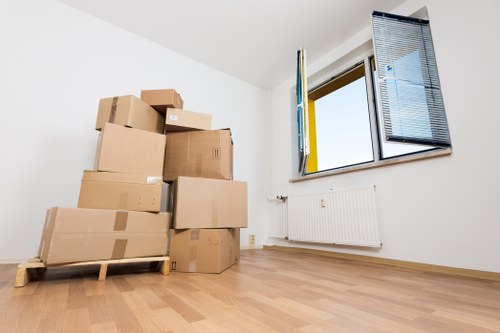Comprehensive Waste Removal Services in West London

Managing waste effectively is crucial for maintaining a clean and healthy environment in West London. Whether you're a homeowner, a business owner, or managing a construction site, proper waste removal services ensure that unwanted items are disposed of responsibly and efficiently.
West London, known for its vibrant communities and bustling commercial areas, generates a significant amount of waste daily. From household rubbish to industrial by-products, the diversity of waste requires specialized handling and disposal methods to minimize environmental impact.
Choosing the right waste removal service can make a substantial difference in how your waste is managed. It ensures compliance with local regulations, promotes recycling and reuse, and contributes to the overall sustainability goals of the community.

Types of Waste Removal Services
Waste removal services in West London cater to a variety of needs, ensuring that all types of waste are handled appropriately. Below are the primary services offered:
Residential Waste Removal
Residential waste removal focuses on the collection and disposal of household waste. This includes general rubbish, bulky items like furniture, and recyclable materials. Many services offer scheduled pickups, making it convenient for households to manage their waste without hassle.
Commercial Waste Removal
Businesses in West London generate waste that requires regular and reliable removal. Commercial waste services handle office waste, construction debris, and industrial by-products, ensuring that businesses comply with local waste disposal regulations.
Recycling and Composting
Recycling services play a vital role in reducing the amount of waste sent to landfills. Waste removal companies often provide recycling options for paper, glass, plastics, and metals. Composting organic waste is another sustainable practice that helps in reducing environmental impact.

Benefits of Professional Waste Removal
- Environmental Protection: Proper waste management prevents pollution and conserves natural resources.
- Health and Safety: Reduces the risk of health hazards associated with improper waste disposal.
- Compliance: Ensures adherence to local waste disposal laws and regulations.
- Convenience: Saves time and effort by managing waste collection and disposal efficiently.
- Cost-Effective: Prevents potential fines and reduces the need for self-managed waste disposal methods.
Choosing the Right Waste Removal Service
Selecting a reliable waste removal service involves considering several factors:
- Reputation: Look for companies with positive reviews and a proven track record.
- Services Offered: Ensure the company provides the specific services you need, whether it's residential, commercial, or specialized waste removal.
- Pricing: Compare rates to find a service that fits your budget without compromising on quality.
- Environmental Practices: Choose companies that prioritize recycling and sustainable disposal methods.
- Customer Support: Responsive and helpful customer service can make the process smoother and more efficient.

Local Areas Served by West London Waste Removal
West London waste removal services extend their expertise to various nearby areas, ensuring comprehensive coverage and localized support. Here are some of the key areas serviced:
- Hammersmith: Known for its vibrant cultural scene and busy commercial districts, Hammersmith requires efficient waste management solutions to handle the high volume of daily waste.
- Chiswick: A residential and commercial hub, Chiswick benefits from tailored waste removal services that cater to both households and businesses.
- Shepherd’s Bush: With its bustling retail and entertainment venues, Shepherd’s Bush relies on prompt waste removal to maintain cleanliness and order.
- Ealing: A diverse area with a mix of urban and suburban environments, Ealing needs versatile waste removal services to address different waste types.
- Richmond: Known for its beautiful parks and green spaces, Richmond emphasizes eco-friendly waste disposal and recycling initiatives.
- Acton: Acton’s industrial and residential zones require comprehensive waste management strategies to handle various waste streams.
- Hounslow: A key area with significant commercial activity, Hounslow benefits from reliable and consistent waste removal services.
- Wembley: Especially during events at Wembley Stadium, the demand for efficient waste removal skyrockets, requiring specialized services.
- Fulham: Fulham’s mix of upscale residences and commercial establishments necessitates high-quality waste management solutions.
- Brentford: Brentford’s growth as a business district calls for scalable waste removal services to match its expanding needs.
- Twickenham: With its renowned sports venues, Twickenham requires effective waste management to support large-scale events.
- Kensington: An area with many historical sites and affluent residences, Kensington demands meticulous and eco-friendly waste disposal methods.
- Paddington: Paddington’s transportation hubs and commercial areas need efficient waste removal to handle the high influx of daily waste.
- Northolt: A suburban area with a mix of residential and commercial properties, Northolt benefits from flexible waste removal services.

Eco-Friendly Waste Removal Practices
Adopting eco-friendly waste removal practices is essential for reducing the environmental footprint of waste disposal. Here are some key strategies:
Recycling Programs
Implementing comprehensive recycling programs ensures that materials such as paper, glass, plastics, and metals are reused, thereby conserving resources and reducing landfill waste.
Composting Organic Waste
Composting organic waste like food scraps and garden waste transforms it into valuable compost, which can be used to enrich soil and support sustainable gardening practices.
Hazardous Waste Disposal
Proper disposal of hazardous waste, including chemicals, electronics, and batteries, prevents environmental contamination and promotes public health.
Reduction of Single-Use Items
Encouraging the use of reusable and recyclable items minimizes the production of single-use waste, contributing to a more sustainable waste management system.
Community Education
Educating the community about the importance of waste reduction, recycling, and responsible disposal practices fosters a culture of environmental stewardship.
Technology in Waste Removal
Modern technology plays a significant role in enhancing the efficiency and effectiveness of waste removal services. Innovations such as route optimization software, automated sorting systems, and real-time tracking have revolutionized the industry.
Route Optimization
Using advanced software to plan the most efficient collection routes reduces fuel consumption, lowers operational costs, and minimizes environmental impact.
Automated Sorting
Automated sorting systems streamline the separation of recyclables from general waste, increasing recycling rates and reducing manual labor.
Real-Time Tracking
Real-time tracking of waste collection vehicles ensures timely pickups, enhances service reliability, and provides customers with accurate information about their waste collection schedules.
Challenges in Waste Removal
Despite advancements, waste removal services face several challenges that need to be addressed to improve efficiency and sustainability:
- Increasing Waste Volume: The growing population and economic activities in West London result in higher waste volumes, stressing existing waste management systems.
- Recycling Contamination: Improper sorting of recyclables leads to contamination, reducing the quality of recycled materials and increasing processing costs.
- Regulatory Compliance: Keeping up with evolving waste disposal regulations requires continuous adaptation and investment in compliance measures.
- Public Participation: Encouraging community members to participate actively in recycling and waste reduction programs is essential for their success.
- Resource Allocation: Efficiently allocating resources to meet varying waste removal demands across different areas can be challenging.
The Future of Waste Removal in West London
The future of waste removal in West London looks promising, with a focus on innovation, sustainability, and community engagement. Key trends shaping the future include:
Smart Waste Management Systems
Integrating IoT devices and smart sensors into waste bins can provide real-time data on waste levels, enabling more efficient collection schedules and reducing unnecessary pickups.
Circular Economy Initiatives
Promoting a circular economy where products are reused, repaired, and recycled extends the lifecycle of materials and reduces the demand for new resources.
Advanced Recycling Technologies
Investing in advanced recycling technologies, such as chemical recycling and biotechnological processes, enhances the ability to recycle complex materials and reduces waste generation.
Community-Based Programs
Developing community-based waste management programs fosters local participation, encourages sustainable practices, and builds a sense of responsibility towards the environment.
Conclusion
Effective waste removal services are a cornerstone of a sustainable and healthy West London. By choosing professional services that prioritize environmental responsibility, convenience, and compliance, residents and businesses can contribute to a cleaner, greener community. Embracing innovative practices and fostering community engagement will further enhance the efficiency and impact of waste management efforts in the region.
Frequently Asked Questions
1. What types of waste can be removed by West London waste removal services?
West London waste removal services handle a wide range of waste types, including household rubbish, bulky items, construction debris, recyclable materials, and hazardous waste. It's best to contact your chosen provider to confirm the specific types of waste they can manage.
2. How often does waste removal occur in West London?
The frequency of waste removal depends on the service plan you choose. Most residential services offer weekly or bi-weekly pickups, while commercial and industrial services may provide daily or customized schedules based on the volume of waste generated.
3. Are recycling services included in waste removal?
Yes, many waste removal services in West London include recycling options. They typically separate recyclable materials such as paper, glass, plastics, and metals from general waste to ensure proper recycling and reduce landfill usage.
4. How can I reduce my waste output?
Reducing waste output can be achieved by practicing recycling, composting organic waste, avoiding single-use items, choosing reusable products, and minimizing unnecessary purchases. Additionally, donating or selling items you no longer need can help reduce the amount of waste you generate.
5. What should I do with hazardous waste?
Hazardous waste, including chemicals, electronics, and batteries, should be handled with care to prevent environmental contamination. It's important to use a specialized waste removal service that is licensed to dispose of hazardous materials safely and in compliance with local regulations.